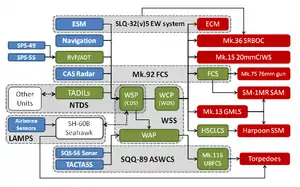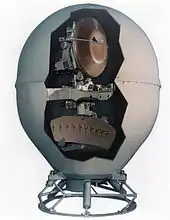Mark 92 Guided Missile Fire Control System
The Mark 92 Fire Control System is a US-built medium-range anti-aircraft missile and gun fire control system. It was developed for the FFG-7 Oliver Hazard Perry class guided missile frigates. The system is a licensed USN version of the Thales Nederland WM-25 fire control system. The Mark 92 fire control system was approved for service use in 1975. Introduction to the fleet and follow-on test and evaluation began in 1978.[1]

Radar Systems
The Mark 92 system assigns targets via the ship's air search radar, and surface search radar or from the Mark 92's own search radar capabilities.[1] The system has two or three radar sub-systems depending on the model. The first two are combined into a single system called the Combined Antenna System or CAS is used in all models. The CAS has a track while scan radar (Search) and a tracking radar both housed in an egg shaped radome. The radars can search for, track, and illuminate targets. There is also a third radar for target illumination referred to as the Separate Target Illumination Radar or STIR. The STIR is a radar developed from the AN/SPG-60 radar that is part of the Mark 86 gun fire control system.
Versions

- Mark 92 modification 0 is an early version of the system for the USN.
- Gun and missile control:
- 1 air engagement channel
- 2 surface-search, TWS channels
- Mark 92 modification 1 is the version used by United States Coast Guard cutters as well as the PHM-1 Class USN hydrofoils (excluding USS Pegasus. It does not use the STIR or control surface to air missiles.
- Gun only:
- 1 air engagement channel
- 2 surface-search, TWS channels
- Mark 92 modification 2 is the version that was originally fit to USN Oliver Hazard Perry-class guided missile frigates. It was also installed on the Adelaide-class derivatives built for Australia.
- Gun and missile control:
- 2 air engagement channels, including STIR with Mark 107 console
- 2 surface-search, TWS channels
- Mark 92 modification 5 is used by certain Saudi Arabian Badr-class corvettes (PGG and PCG Class ships).
- Gun only:
- 1 air engagement channel
- 2 surface-search, TWS channels
- Mark 92 modification 6 is an upgraded version of the modification 2 as part of the CORT program. It was installed on 12 USN FFG-7-class frigates, the eight Republic of China Navy's Cheng Kung-class frigates and two of the Spanish Santa Maria-class frigates.
- 2 air engagement channels, including STIR with Mark 107 console and (coherent receiver/transmitter CORT) transceiver
- 2 surface-search, TWS channels
| Modification | Surface Engagement Channels | Air Engagement Channels (gun) | Air Engagement Channels (missile) |
| 0 | 2 | 1 | 1 |
| 1 | 2 | 1 | 0 |
| 2 | 2 | 1 | 2 |
| 5 | 2 | 1 | 0 |
| 6 | 2 | 1 | 2 |
STIR (Separate Target Illumination Radar) Deactivated
The USN retired the RIM-66E, or Standard missile-1, from active service in 2003. Oliver Hazard Perry frigates in USN service have had the STIR radar removed. The STIR radars are still in use on non-USN vessels.
References
- "MK 92 Fire Control System (FCS)". GlobalSecurity.org. Retrieved 2008-12-12.
- "MK 92 Fire Control System Manufacturer Doc" (PDF). GlobalSecurity.org. Retrieved 2009-02-26.